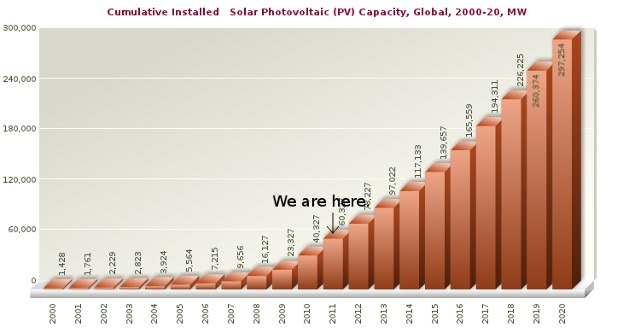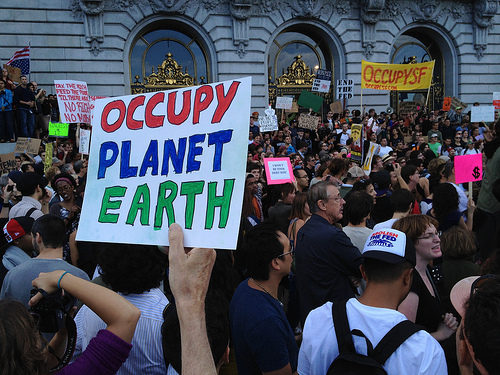 The New York Times has its head in the sand when it comes to climate and energy.Here are excerpts from two erroneous and contradictory pieces in this week’s dreadful New York Times special section on energy:
The New York Times has its head in the sand when it comes to climate and energy.Here are excerpts from two erroneous and contradictory pieces in this week’s dreadful New York Times special section on energy:
NYT 1: According to the most recent estimates of the Energy Department, world energy demand is going to increase by 50 percent by 2035, largely because of increased consumption in China, India, and the rest of the developing world. Renewable energy will rise as a percentage of energy used, to 15 percent from 10 percent [by 2035], but that will not provide for the growing demand. “The fossil fuel age will be extended for decades,” said Ivan Sandrea, president of the Energy Intelligence Group, a research publisher. “Unconventional oil and gas are at the beginning of a technological cycle that can last 60 years. They are really in their infancy.”
NYT 2: And as for the jobs [solar] creates, there may be a price elsewhere, Dr. Axelrod said. He described the energy world as being like a child’s squeeze toy: “You squeeze it and the eyes pop out. If you push in one area, something else is going to happen.” … Build enough solar plants and some coal plants will shut down; that would amount to firing Peter to hire Paul … Solar panel fabrication was intended as an export industry …
I think it is safe to cancel your subscriptions to the one-time paper of record. While there are one or two reporters at The New York Times who get climate and energy, it’s obvious that most don’t, and, more importantly, the editorial staff simply don’t know what they’re doing. The Matt Wald piece, No. 2, is so biased and self-contradictory as to be simply unpublishable.
Are there even editors who oversee reporters anymore or try to give coherence to special sections and the paper’s larger coverage — or who write headlines that reflect the content of the stories? Apparently not. Apparently the paper can simultaneously assert that energy demand is growing, that renewables’ share of the market will grow — and thus its absolute growth rate will be very fast — but that U.S. solar jobs will come at the expense of U.S. jobs elsewhere, even though the paper says it’s an export industry.
Seriously, NYT editors and reporters, if you’re going to publish self-contradictory attacks on some energy technology, couldn’t you at least pick on one your size, one that also happens to threaten civilization? Or wait a few years, until the solar industry surprises you and actually is your size.

The future of humanity is being written now — but you just won’t find very many of the stories in the Gray Lady. That is painfully clear from their uninformed, self-contradictory, and virtually climate-free special section on energy.
I have been bombarded with emails from people baffled by just how dreadful these stories are. Here is one from a leading expert who works with environmentally responsible businesses:
Hey Joe,
Please tell me if I’m missing something here:
You may have seen the NYT special section today on energy. The lead story, maybe 60-65 paragraphs, devotes exactly one paragraph to saying that the unleashing of numerous new forms of fossil fuels worldwide “is a devil’s bargain, probably making solutions to climate change … even more difficult.”
Nary another word in that story, and only tiny passing mentions in others in the special section, about the climate threat.
So, I ask you this question dead seriously: Am I stupid — am I actually missing something about climate change that these knowledgeable reporters get? Can we have serious talk in the NYT — from many, many industry and other sources — about these new fossil discoveries extending the fossil fuel for decades WITHOUT taking into account my understanding that we can’t do that without unleashing the worst of climate change?
I’m serious — the reporting is so oblivious that it leads me to ask if I myself am missing something about climate change’s severity and onset. Can you explain this to me?
Or is this just almost breathtakingly lame reporting?
Perplexed
Dear Perplexed:
The latter, I’m afraid.
You are plenty smart, and the science couldn’t be clearer about climate change’s severity and onset — see my review of 50 recent studies or my new Nature piece on Dust-Bowlification.
The threat of climate change isn’t “news” to the Times. There is one tireless climate reporter who keeps reporting on the increasingly dire picture of the science, Justin Gillis. You can see his recent articles here. He writes articles explaining things like “Why climate scientists are so perturbed: Society has put off the task of reducing carbon dioxide and other emissions for so long that it is on the verge of running out of time, a report argues” and “Food supply under strain on a warming planet” and “Global warming hinders crop yields, study finds” and “Even as the situation in the world’s forests starts to look precarious, scientists do not really have the capability they need to monitor the problems” and the like. Individually, the pieces are worrisome, and cumulatively they are pretty good picture of the gravest threat to human civilization.
But for the rest of the people at the paper, I guess Gillis is just that guy who keeps reporting all that dreary science stuff. He probably gets the same readership internally at the paper that the obituaries do. The rest of the paper goes on as if every major climate scientist, science journal, national academy, and indeed, most governments, weren’t screaming at the top of their lungs: “We are in big trouble and business as usual is suicidal.”
And so we get the special section on energy, pieces which, individually, are worrisome indicators about the Times‘ editorial judgment, but cumulatively are a pretty good picture of how modern journalism has collapsed in its coverage of the story of the century.
As I noted above, it is obvious that solar is becoming a massive job creator and has a huge potential upside.
But Wald wants to find a downside, since who really wants to read a sappy “good news” story, even if it fits the facts? What sells, apparently even to NYT editors, is bullshit contrarianism, a headline like, “Solar Power Industry Falls Short of Hopes in Job Creation.”
Yes, the industry is undeniably doing well, even in the face of the greatest recession since the Great Depression — oh, but it isn’t doing as well as people had hoped. Who are these people? Not Wald or the NYT, that’s for sure. But people. You know them. Those hopeful folks who are always hoping things will get better, including the paper’s hopeless coverage.
You’d better know who the heck these hopers are, because Wald doesn’t name a single person who said we would get more a lot more solar jobs than we have. Nor does he even point to one study that said we would get more solar jobs. So this is yet another BS headline from the editors at the Times.
The correct headline would be “Solar Power Industry Job Growth Greatly Exceeds that of the Rest of the Economy,” as Wald himself admits in a couple of sentences buried in the article, far, far past the headline and thus far, far past the point most people will read:
Environment America, an advocacy group, said in a recent report that only about 24,000 people work in solar manufacturing in this country, compared with 52,500 in installation, out of a total of about 100,000. That is a hefty number, and up 6.8 percent in the last year. But the definition is a bit slippery. It applies to workers who spend at least half their time on solar work.
As a small aside, Wald feels obliged to label Environment America an “advocacy group” but quotes “John Felmy, the chief economist at the American Petroleum Institute,” as if everybody knows that API shills for the fossil fuel industry — an industry that takes out big ads in the paper and gets such adoration in the top story in the special energy section.
As a big aside, how exactly is that definition too “slippery”? It seems pretty clear to me. Wald, however, must put in a “but” for every fact that makes clear renewables are a remarkably good jobs creator.
Wald just rolls out the right-wing talking points, though:
At a recent hearing of the House Energy and Commerce Committee, whose Republican majority has latched on to Solyndra with a vengeance, Scott DesJarlais, Republican of Tennessee, compared the benefits of solar power to the Tennessee farmer who drives into Alabama to buy watermelons for a dollar each and resells them at home for 75 cents.
“He does this a few times, and clearly he isn’t making a profit,” Mr. DesJarlais said. “And he comes to the conclusion that he needs a bigger truck.”
This may prove unfair in the long run.
May prove unfair in the long run? It’s idiotic right now.
First off, if the Republicans — and Wald — actually believe this nonsense, then I guess they would have no objection whatsoever to eliminating the massive subsidies for fossil fuels. After all, keeping them implies that the government believes fossil fuels are unprofitable watermelons in need of help.
Second, solar is cost effective and profitable in many parts of the country right now where you can get solar for no money down.
Third, Wald — and his bosses — seem perversely unwilling to talk about the fact that fossil fuels are killing people right now, making them sick and generally destroying a livable climate. This is all Wald writes:
This may prove unfair in the long run. If fossil fuel prices rise high enough or governments begin to collect big charges for carbon dioxide releases, solar power could turn into an unsubsidized success. Renewable energy is recognized as representing a hedge against future shifts in the prices of fuels and the strictness of pollution regulations.
Try again. Renewable energy is recognized by a great many people as representing a net cost to society below that of fossil fuels, irrespective of the actual price of fossil fuels, CO2 prices, or regulations.
Indeed, Wald can’t possibly be unaware of the fact that some of the leading economists in the country (center-right non-environmentalists) have just demonstrated that fact in peer-reviewed literature.
But Wald not only never mentions any of this, he actually writes:
And if the electricity from the solar installation is more expensive than the energy it replaced, then everybody who uses electricity will spend a little more for it, and everybody who pays taxes will contribute to the government subsidies for solar. Thus there will be a little less money to spend on other activities that could also generate employment.
I’ve been told by someone in the media business that this paragraph of nonsensical and ultimately self-destructive libertarianism actually represents Wald’s own political philosophy. It’s supposed to be the job of the editors to keep such spin out of the news if it is as demonstrably false as this.
Again, we know know how incomplete and thus literally unhealthy this view is from some of the leading economists in the country — Nicholas Z. Muller, Robert Mendelsohn, and William Nordhaus — in a top economic journal, the American Economic Review. Assuming, that is, we didn’t already know it from the rest of the literature.
The accurate statement the Times might have written is:
If the electricity from fossil fuel plants does more harm than good, then everybody who uses that electricity is harming public health, however unintentionally, and if they instead get electricity from renewables with the help of government subsidies, then everybody who pays taxes will contribute to improving the public health and avoiding catastrophic climate change. Thus there will be more healthy people, fewer dead people, more productivity, and ultimately more employment.
I would add that the NYT published an article this week titled, “China Takes a Loss to Get Ahead in the Business of Fresh Water.” But apparently the editors seem to think that only China should invest in emerging industries that are going to be massive job creators in the coming years.
Apparently, China’s short-term losses to achieve long-term gains are smart business, but America’s are dumb. Seriously, why isn’t the headline of that article “Chinese Water Industry Falls Short of Hopes in Job Creation and Profitability”?
This post is long enough, though barely scratches the surface of debunking the NYT articles.
I’ll let you find the flaws in the dreadful piece Perplexed complained about — “New Technologies Redraw the World’s Energy Picture” — which similarly acts as if we don’t know already that a world of ever increasing fossil fuels risks multiple simultaneous catastrophes that threaten the health and well-being of billions of people, that may make it all but impossible to feed 9 billion people by midcentury.
Or you could just end your subscription and stop reading the paper. It will save you time and money and head vises.
Note: I see some folks have been tweeting @MattWaldNYT:
- @drgrist tweets: @MattWaldNYT runs a hit piece on solar in @NYTimes, quoting only critics: is.gd/Vecbxh I’m too sick to deal with this sh*t.
- @samboykin tweets: @MattWaldNYT You talk to 2 Republicans, the American Petroleum Inst, a fossil fuel consultant, & 2 economists from PA. Weak journalism.
- @alannogee tweets: @MattWaldNYT A few net jobs studies: UCS: bit.ly/1nUm3 Navigant: bit.ly/vUVOrq LBNL revie… (cont) deck.ly/~rJmJS



